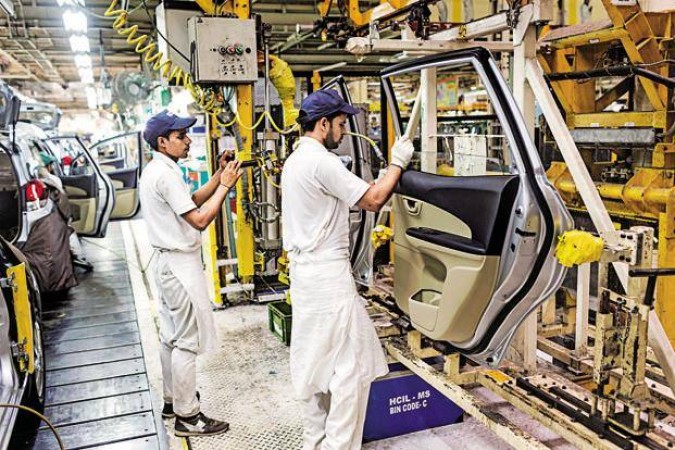
New Delhi: In a sign of potential slowdown, the Purchasing Managers' Index (PMI) for manufacturing has revealed a slight decline in factory output in June. The PMI, which serves as a key indicator of economic health, dropped to 57.8 last month, down from 58.7 in May. While the index remains above the 50-point threshold, signalling expansion in the manufacturing sector, the decrease raises concerns about the pace of growth and the broader economic outlook.
The PMI, compiled by the Institute for Supply Management (ISM), surveys purchasing managers in various industries across the country. A reading above 50 indicates expansion, while a reading below 50 suggests contraction. The PMI is considered a reliable barometer for measuring manufacturing activity and can provide insight into overall economic trends.
Also read:Unexpected Surge in Unemployment in Germany Linked to Ukrainian Refugee Influx
The slight decline in June's PMI can be attributed to several factors. Supply chain disruptions and material shortages have continued to plague manufacturers, hampering production, and causing delays. The ongoing global semiconductor shortage, for example, has significantly impacted the automotive and electronics industries, leading to production bottlenecks and reduced output.
Additionally, labour shortages have emerged as a persistent challenge for manufacturers. Despite efforts to attract workers through higher wages and incentives, many companies are struggling to find skilled labour, which is limiting their production capacity. The shortage of skilled workers has also contributed to longer delivery times, adding further strain to the manufacturing sector.
While the drop in factory output is concerning, it is important to note that the PMI remains above 50, indicating expansion. However, the decline suggests a potential moderation in the pace of growth compared to previous months. Economists and analysts will closely monitor the PMI in the coming months to assess whether this is a temporary setback or a more sustained trend.
Also read:Russia's Foreign Debt Hits Multi-Year Lows, Boosting Economic Stability
The manufacturing sector has been a significant driver of economic recovery in many countries, contributing to job creation, export growth, and overall economic expansion. A slowdown in factory output could have ripple effects throughout the economy, impacting related sectors and potentially dampening consumer sentiment.
The decline in the PMI also underscores the challenges faced by policymakers and central banks as they navigate the post-pandemic recovery. Balancing the need for economic stimulus with concerns over inflationary pressures and supply chain disruptions presents a delicate task. Monetary authorities will closely monitor these developments to determine the appropriate course of action.
On a positive note, the PMI data also reveals some encouraging trends. New orders and export orders remain robust, indicating sustained demand for manufactured goods both domestically and internationally. Additionally, manufacturers' sentiment regarding the outlook remains positive, albeit slightly tempered by current challenges.
Also read:France and UAE Committed to Clean Energy Transition Says Trade Minister
As the world gradually emerges from the pandemic, the manufacturing sector will continue to play a critical role in driving economic growth. Efforts to address supply chain disruptions, labour shortages, and other challenges will be crucial in ensuring a robust and sustainable recovery.
Overall, the slight decline in factory output reflected in the PMI for manufacturing in June highlights the need for continued vigilance and proactive measures to support the sector. Policymakers, industry leaders, and economists will closely monitor future PMI readings to gauge the trajectory of manufacturing activity and its broader implications for the economy.